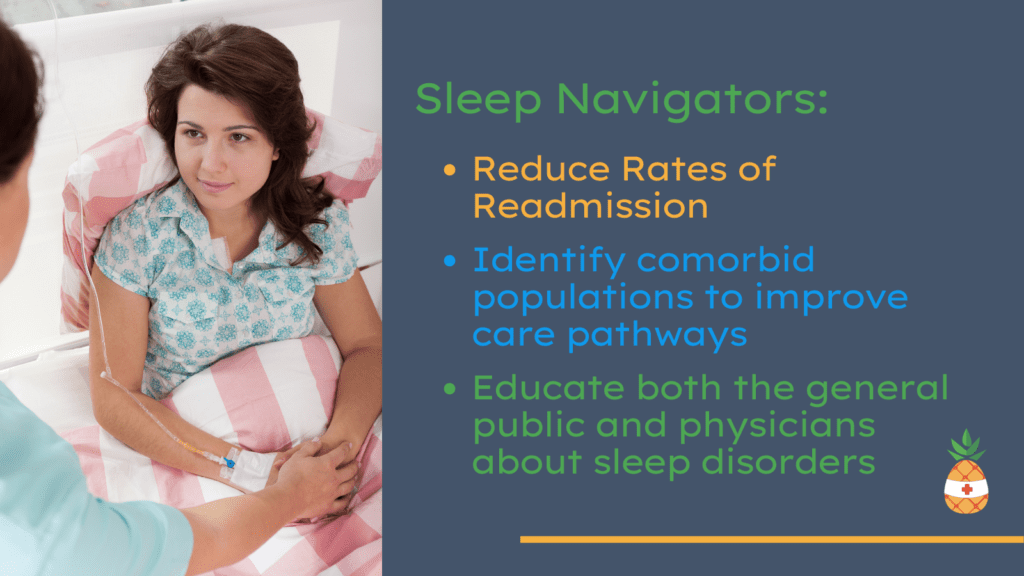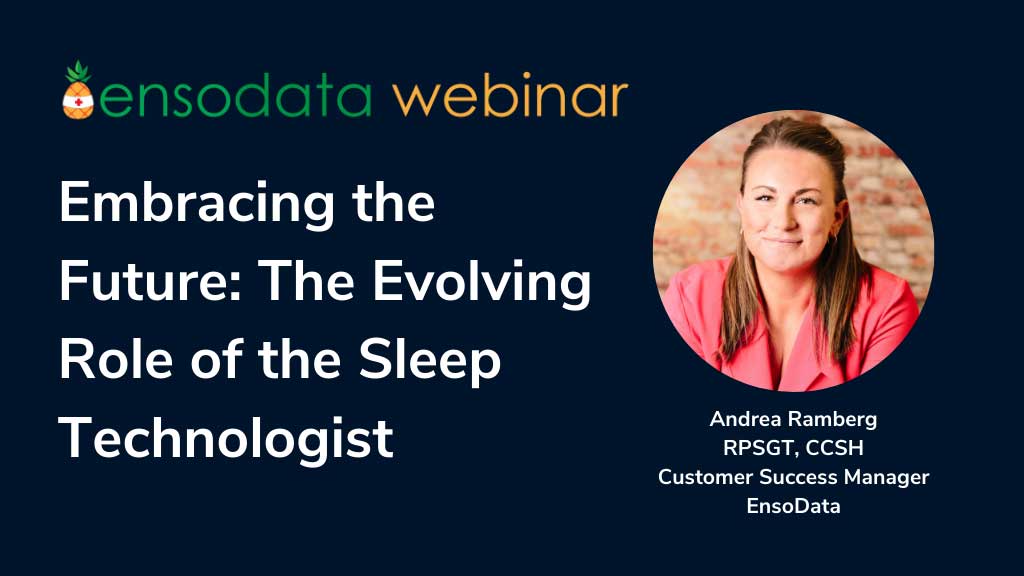Hey Sleep Techs: Does your Health System have a Sleep Navigator yet?
The massive operations at Health Systems nationwide can often lead individuals to feel like their role is merely that of a cog in a machine. As a sleep technologist, your primary responsibility in a health system is to manage the patient’s sleep medicine experience, but how you do that goes far beyond the simple description. As technology steps in to expedite some of your more time-consuming tasks – like the scoring and staging process – technologists are one group set for a massive shift in focus in the next decade.
How Sleep Navigators are expanding patient education at Health Systems across the U.S.
When we ask technologists: ‘what’s considered a successful day in your health system?,’ a majority of those primed for sleep navigator roles will respond with something along the lines of: making the right diagnosis and taking care of my patients. Rarely will a budding sleep navigator mention their day-to-day tasks, rather, they’ll focus on the bigger picture.
For most sleep professionals, the goal is getting the right treatment options in place for each patient that comes through the door. And with that in mind, health systems looking to improve their staff’s skills and patient’s care simultaneously should consider a shift in their sleep medicine practice. To provide a more holistic care experience, health systems should consider adding a sleep navigator to the mix. But more than that, a sleep navigator will help streamline the patient experience and help treat your patients more completely.
Why do Health Systems Need a Sleep Navigator?
The reasons your health system should add a sleep navigator are plentiful, but these three elements stand out most if you’re looking to convince your clinical director that a sleep navigator is right for your team. Sleep navigators are reducing readmissions, identifying co-morbid populations to improve care pathways, and educating both the general public and general physicians about sleep disorders. For many patients who learn of their new sleep disorder, their situation can be exacerbated by a long care process. Adherence is likelier when the education and process is smooth and structured. With that in mind, a major way the sleep navigator makes an impact is helping reduce patient readmissions and the average length of stay.

Similarly, an attentive, knowledgeable sleep navigator is likely to drive better patient care within your health system. A sleep navigator will be the one who’s best positioned to identify patients whose disease state is compounded by untreated sleep apnea. Better patient care is possible when these comorbidities are identified earlier in the process.
The final, big, “why” to the sleep navigator question is their ability to educate both the general public and PCPs simultaneously. Sleep education comes in a variety of ways, but awareness in both these populations is a critical step. Sleep navigators will ultimately be focused on making the right diagnosis and taking care of their patients’ sleep health. In health systems without a sleep navigator, the sleep technologists and technicians might be serving this role, but their time is very spread out.
One way for health systems to open up time for their leading techs is to leverage the latest sleep technology, including AI sleep scoring and staging technologies like our own EnsoSleep.
How is Technology affecting Sleep Technologists?
The diagnostic process is changing, and technology is advancing rapidly. From the recent growth in the home sleep apnea testing (HSAT) market to improving and evolving wearable technologies, sleep medicine is being buoyed by tech advances. For sleep professionals and patients, technology is increasing access to care, improving outcomes, and enhancing patient and physician satisfaction, while at the same time reducing costs. The big question: where does this leave sleep technologists and others in the sleep world?
Take our own AI sleep scoring solution: EnsoSleep. EnsoSleep is revolutionizing the sleep scoring process by providing consistently scored studies for technologists to review and approve before sending them to the physician. Rather than spending an hour scoring a PSG study from scratch, technologists are able to review the AI scored study in a fraction of that time – with some teams spending just 10-15 minutes per study with EnsoSleep. For the technologists who are diving into the full patient experience, our AI is the perfect way for you to continue to grow in your career, and the sleep navigator role might be the right next step for you.
What does the Sleep Navigator Role mean for Hospitals, Physicians and Patients?
While our sleep scoring AI is a great assistive tool for sleep technologists, there’s one thing that you, and only you, can provide as technologists, and that’s patient care and experience. Part of what a human really appreciates about the care they receive is seeing your empathy and your compassion. They want to know that you truly care for them. And that’s the backbone of the new sleep navigator position. The sleep navigator role is really a focus on care as technology frees your time up for other activities beyond simply scoring tests.
When technicians have more time in the day to tackle tasks beyond scoring, they can better educate their patients on what to expect during the process, what their diagnosis means for their short- and long-term health, and what treatment options are available. This allows the relationship to be built from the ground up, cultivating a better understanding in the average patient. Having a better comprehension of both what their diagnosis is and what their future holds leads to better compliance and overall patient wellness.
Why Sleep Navigation is Important to the Future of Sleep Medicine
Sleep medicine needs the sleep navigator role. There isn’t a true champion for sleep in many health systems. When you add a sleep navigator, you have that champion to literally walk the hospital floors and provide the much-needed care to patients. Not only that, but sleep navigators provide a voice to educate colleagues in medical disciplines who aren’t as versed in sleep health. As Andrea Ramberg, EnsoData’s in-house RPSGT and clinical informaticist, shares in an upcoming AAST A2Zzz educational article, “Collaboration between Technologist and Technology is the Future of Sleep Scoring,” the sleep navigator program is a health system game changer:
“Ultimately, sleep navigator programs provide a concrete, valuable way the sleep health clinician can help their patients and broader organization,” said Ramberg, RPSGT, CCSH.
At EnsoData, we rely on and need to work with clinicians and technologists. Our scoring AI will simplify your lives and will save health systems time, but it’s still on you to treat your patients. And, when you add EnsoSleep to your process, you’re able to offload the heavy lifting that goes into scoring and refocus on patients. If that means you are able to add a sleep navigator program, that’s going to change the way your patients receive care. And that’s what we’re hoping to help with at the end of the day… getting more patients the care they need to treat the sleep disorders that are impacting their lives.
If you’d like to learn more about the innovative role of Sleep Navigator, click on the image below to watch our free educational webinar!
And for techs and supervisors working at health systems or private clinics alike, if the AI Scoring mentioned above piqued your interest, watch the video below to see how an AI sleep scoring solution can simplify the process at your sleep center, then set up a consultation to talk with our team.
Other Sleep Medicine Content from the EnsoData Blog:







